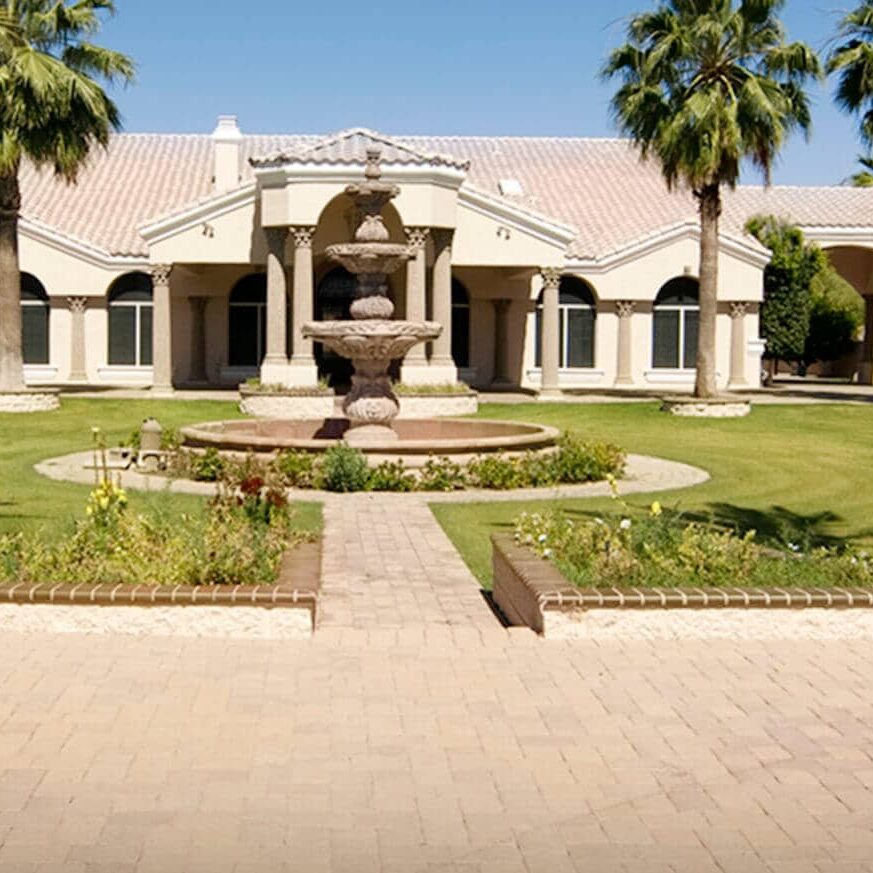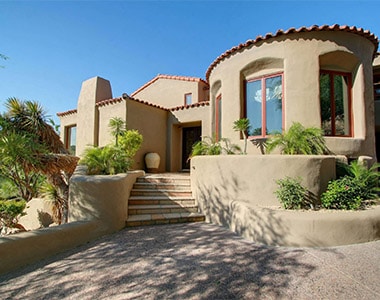If you are worried that you might need extra liability coverage, you can purchase umbrella coverage, which will provide you a higher limit than your typical liability coverage. Umbrella coverage is available in amounts ranging from one to five million dollars and can cover things that your normal liability insurance doesn’t cover, like insurance for libel and slander. Additionally, with excess liability coverage, you can be covered on or off your property, anywhere in the world.
Casa Grande Home Insurance
Home Insurance Basics
Whether you’re at home or away, you want to know that your belongings are protected. That’s why everyone needs homeowners insurance. It protects your home and belongings in case of fire, smoke, vandalism, theft, hail or similar events. It also covers your personal liability in case someone is injured while on your property—like when the mailman trips over your kid’s skateboard.
It’s important to remember that you will usually have to purchase additional coverage if you want to insure your home in case of flood or earthquake--luckily earthquakes aren't common in Casa Grande and flooding only happens occasionally. Other things that aren’t covered by most basic policies are pool injuries, damage done by termites, water damage from sewer backups, and sometimes mold removal, depending on the cause of the mold.

How Much Insurance Do I Need?
The amount of homeowners insurance you will need to purchase depends on a variety of factors. To put it simply, you will need enough to cover the cost of rebuilding your home based on what it is worth today. Depending on the bank your mortgage is with, you may need to purchase enough policy to cover the amount of the mortgage.
Some factors that cause the price of your policy to vary are the age of your home, the coverage, limits and deductibles you pick and where your home is located. If you live in an area prone to severe weather, you may need to pay more.
The average annual cost in Arizona is $695, or $57.94 a month. To find out what you will pay for homeowners insurance in Casa Grande, give us a call or get an online quote today!
So How Much Insurance Do I Need?
You can estimate how much it will cost to rebuild your house by finding out the average cost per square foot in the place your home is built. Keep in mind that any upgrades your home has, like custom woodwork, arched windows or other specialty features, will cost more to replace. So you will need to buy additional coverage if you want these items to be covered too. Here are some other features that can add to your rebuilding costs:
- A finished or partially finished basement
- Additional rooms
- Garages or sheds on your property
- A fireplace or other similar feature
Your agent can help you figure out how much your home will cost to rebuild. If you want to get an idea before talking to an insurance agent, you can consult your real estate agent or your local building association. You can also hire a surveyor if you want an exact figure. It’s important to purchase enough policy to cover the rebuild of your house in the case of total destruction because if you don’t, you will be the one who has to cover the difference.
Need a Mortgage Lender?
-Stephen Gebhardt, Gebhardt InsuranceNeed more proof? She is a 5 star lender on Zillow and the #1 Lender on Zillow for Casa Grande, Arizona.
Dawn Svoboda
Branch Manager | NMLS #177235
442 W Kortsen Road, #104
Casa Grande, AZ 85122
Direct: (520) 316-1341
Mobile: (480) 221-9826
LO State Lic AZ #0913936
Corp NMLS 3113
Corp State Lic AZ #BK0904081
Equal Housing Lender
Replacement Cost Policies
Most policies cover replacement cost for damage to the structure. A replacement cost policy pays for the repair or replacement of damaged property with materials of similar kind and quality. There is no deduction for depreciation -- the decrease in value due to age, wear and tear, and other factors.
If you purchase a flood policy, coverage for the structure is available on a replacement cost basis.
Guaranteed or Extended Replacement Cost Coverage
Extended replacement coverage will pay an extra 20 percent or more above your insurance limit if you need to rebuild your home. A guaranteed replacement cost policy will pay whatever it takes to rebuild. With guaranteed or extended replacement cost coverage, you will pay more in premiums, but your home will have more extensive coverage.
If you don’t have either of these types of coverage and your house burned down, for example, you might get enough money to rebuild your home, but it would only pay for the bare minimum. So if your 3-bedroom, 3-bathroom house was worth $280,000, you might only get $200,000 to rebuild because that is technically what it costs in your area to build that type of house.
Law and Ordinance Insurance
Building codes change periodically, so if your house is badly damaged and you are forced to rebuild all or part of the home you will need to make sure that all the new areas that are built are up to code—and this can cost you.
A few companies offer policies that will pay for you to have your home rebuilt to code if it’s destroyed, but that isn’t’ the norm. In order to be protected from these extra expenses, you will need to buy law and ordinance insurance in addition to your homeowner policy. It isn’t that expensive, and it can save you a lot of money if your home is partially or completely destroyed.
Inflation Guard
As time passes, your home value might decrease or increase depending on a variety of factors. Since your home insurance doesn’t increase as the value of your home does, you might be underinsured and unable to rebuild your home for what it currently costs. That’s where inflation guard coverage comes in. It helps you keep up with inflation by increasing the amount your home is insured for by a certain percentage each year. Inflation guard coverage is usually optional, but may be necessary for policies with combined coverage limits of less than $1.5 million.
What if I Have an Older Home?
Older homes can be great. They are full of character and unique features that oftentimes aren’t found in newer constructions. You want to protect the features that make your home amazing and unique, but there are some common factors found in older homes, like old wiring, outdated plumbing, vulnerable roofs or old appliances, that might cause you more in your policy.
Replacement cost policies are usually what owners of older homes want to purchase. Instead of giving you cash value for the repairs, a replacement cost policy will pay you the full cost to repair or replace your home, up to your limit.
In order to protect you from the unique challenges your older home might present, you may want to add additional protection as well. Luckily, at Gebhardt Insurance, we shop around on your behalf until we find the right coverage for all of your needs.
Insuring Your Personal Possessions
Another great thing about homeowners insurance is that it covers your belongings if they are damaged or stolen. There are two ways that the company can replace your items: actual cash value coverage or with replacement cost coverage. Actual cash value would cover the fair market value of your items (replacement cost minus any depreciation). Replacement cost coverage would pay you how much it would cost you to re-purchase the item at the time of your claim.
Insuring Your Possessions
You can insure your possessions with an actual cash value policy or a replacement cost policy. A cash value policy factors in depreciation to determine how much money you will get for your damaged or stolen possessions. With a replacement cost policy, you will receive the full amount that it will cost you to replace the item.
If you have especially expensive items, like jewelry, furs or expensive equipment, you may need to purchase an additional type of coverage, called a floater or endorsement. This will allow you to insure each expensive item individually or as a collection based on what the item is worth where you live. You can figure out the worth of your item by having it appraised or providing your home insurance agent with a recent receipt.

Additional Living Expenses After a Disaster
After a disaster you might not be able to live in your home while repairs are being made. Luckily, most home insurance policies cover additional living expenses or “loss of use” costs that you incur due to a covered loss. If you rent out part of your home, the income that you normally receive may also be paid to you.
Some examples of covered expenses are hotel bills, apartment rent and meals at restaurants. Some policies will only pay for the difference between what your normal bills are and what you had to pay because of the disaster. For example, if you normally pay $400 for food every month and now you have to pay $600, the company will pay you $200.
This coverage doesn’t cover your normal expenses such as gas, electric, water, or your mortgage and it won’t pay for you to stay in a five star hotel while your home is being repaired. Your additional living expenses will be covered for the shortest period of time required to repair or replace your home.
Liability Coverage
Liability coverage is what protects you financially if someone is injured or sustains property damage while on your property. It covers damage that may be done by you, your family members or your pets.
Most policies require you to have a minimum of $100,000 worth of liability, but many homeowners purchase $300,000 to $500,000 worth of liability coverage to make sure that there is enough money to cover court costs and any damages that are owed if something happens.
